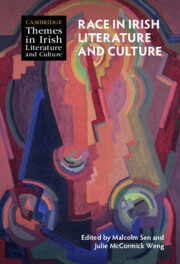Book contents
- Race in Irish Literature and Culture
- Cambridge Themes in Irish Literature and Culture
- Race in Irish Literature and Culture
- Copyright page
- Dedication
- Contents
- Figures
- Contributors
- Editors’ Note
- Introduction
- Chapter 1 “Our Heroic Ancestors”
- Chapter 2 Racializing Irish Historical Consciousness
- Chapter 3 Race, Minstrelsy, and the Irish Stage
- Chapter 4 Race and Irish Women’s Novels in the Long Nineteenth Century
- Chapter 5 Blackface Minstrelsy, Irish Modernism, and the Histories of Irish Whiteness
- Chapter 6 Joyce’s Racial Comedy
- Chapter 7 W. B. Yeats, the Irish Free State, and the Rhetoric of Race Suicide
- Chapter 8 “Ulster’s White Negroes”
- Chapter 9 Learning from Walcott
- Chapter 10 Race, Irishness, and Popular Culture in Australia
- Chapter 11 White Nationalism and Irish America
- Chapter 12 Diasporic Afterlives
- Chapter 13 “Dubh”
- Chapter 14 Split Selves and Double Consciousness in Recent Irish Fiction
- Chapter 15 Race, Place, and the Grounds of Irish Geopolitics
- Select Bibliography
- Index
Chapter 8 - “Ulster’s White Negroes”
Rhetoric of Race at the Start of the Troubles
Published online by Cambridge University Press: 04 January 2024
- Race in Irish Literature and Culture
- Cambridge Themes in Irish Literature and Culture
- Race in Irish Literature and Culture
- Copyright page
- Dedication
- Contents
- Figures
- Contributors
- Editors’ Note
- Introduction
- Chapter 1 “Our Heroic Ancestors”
- Chapter 2 Racializing Irish Historical Consciousness
- Chapter 3 Race, Minstrelsy, and the Irish Stage
- Chapter 4 Race and Irish Women’s Novels in the Long Nineteenth Century
- Chapter 5 Blackface Minstrelsy, Irish Modernism, and the Histories of Irish Whiteness
- Chapter 6 Joyce’s Racial Comedy
- Chapter 7 W. B. Yeats, the Irish Free State, and the Rhetoric of Race Suicide
- Chapter 8 “Ulster’s White Negroes”
- Chapter 9 Learning from Walcott
- Chapter 10 Race, Irishness, and Popular Culture in Australia
- Chapter 11 White Nationalism and Irish America
- Chapter 12 Diasporic Afterlives
- Chapter 13 “Dubh”
- Chapter 14 Split Selves and Double Consciousness in Recent Irish Fiction
- Chapter 15 Race, Place, and the Grounds of Irish Geopolitics
- Select Bibliography
- Index
Summary
Political activists during the Northern Ireland Troubles employed racialized rhetoric, comparing the plight of Catholics to that of African Americans. This strategy aimed to frame the conflict for global audiences, establish transnational networks, and gain local support by invoking solidarity with the Black struggle. Some radicals within the movement even embraced the ideology of the Black Panthers and advocated for a similar Catholic Power movement. In contrast, the Irish Republican Army (IRA) took a different approach, using racialized language to portray their conflict with Britain as an anti-colonial struggle and aligning themselves with Africa. However, this Third Worldism approach inadvertently reinforced colonial power dynamics through their choice of rhetoric. Loyalists, on the other hand, openly acknowledged their perceived privileges as white individuals. For instance, when soldiers opened fire on Protestant rioters, loyalists reminded officers of their shared racial identity by stating, we are not wogs. This chapter argues that activists on both sides of the conflict employed racialized language in complex, contradictory, and ambiguous ways. They strategically utilized racial rhetoric for political gain, even in situations unrelated to the start of the Troubles.
- Type
- Chapter
- Information
- Race in Irish Literature and Culture , pp. 172 - 189Publisher: Cambridge University PressPrint publication year: 2024



